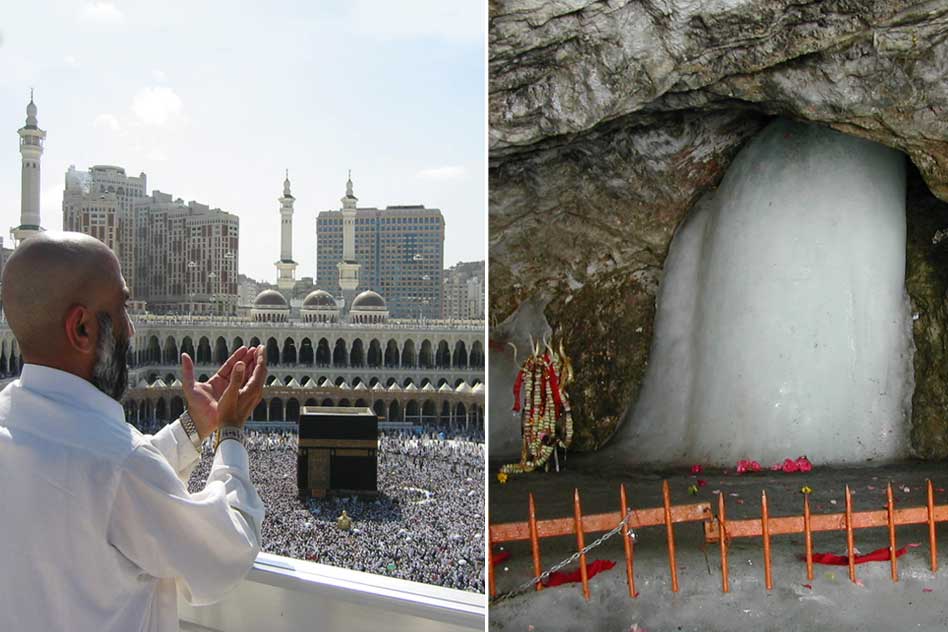
Appeasement Politics: Benefits Given To Hindu And Muslim Pilgrims By The Indian Govt
17 Jan 2017 4:40 AM GMT
India is the birthplace of many religions such as Hinduism, Buddhism, Jainism, and Sikhism. This melting pot houses over 300 million Muslims and over 25 million Christians. The government has also recognised the vast piety that is deeply embedded in India’s society. To honour this spectrum of faiths, the Indian Government provides benefits to religious organisations, specifically exempting them from certain taxes.
Tax exemption
In 1961, the Indian Government passed the Income-tax Act which exempts charitable and religious trusts from paying taxes. The trust must put forth 85% of income derived from their religious activities (including the trust’s objective), and the remaining balance can then be used in the following year. Donations made are also exempted from taxes under section 80G of the Income Tax Act.
However, some religious organisations, such as the Tirumala Tirupati Devasthanams (TTD) Temple, have felt mixed emotions regarding the enforcement of this act. In 2008, the temple management owed Rs 5 crore to the Tirupati Urban Development Authority (TUDA) and the Tirupati Municipal Corporation (TMC). Reports have noted that this not only led to chaotic relations between the TUDA and the TTD but has also impacted the developmental activities in Tirupati as its economy relies on the temple’s presence.
However, because the Temple is a renowned religious institution, under the Income-tax Act of 1961 the board argued that their exemption from paying taxes was justified. According to officials from the TTD properties wing, “The TTD has been earning income only through the offerings made by millions of devotees across the world. The construction of guest houses and mutts in Tirumala was possible only because of donations. Why should we pay tax to the TUDA? In fact, none of the government bodies has taken up development activities in the past two decades in Tirupati.”
The Haj subsidy
Aside from domestic exemption, the Indian Government has been subsidising the travel expenses of Indian Haj Pilgrims; this is enforced through the Haj Committee Act of 1959. These contributions date back to the era of the British Raj. Through the form of discounted airfares on Air India flights, the Government takes care of all transportation costs from Mumbai to Jeddah. Throughout the last century, the Government has subsided more travel locations to destinations including Iraq, Saudi Arabia, Syria, Iran, and Jordan.
Many Muslims have negative opinions on the subsidisation. Maulana Mehmood Madani, politician and general secretary of the Muslim Organization Jamiat Ulema-e-Hind spoke out against the Government’s actions. “It is against the Shariat to be under any kind of obligation while undertaking Haj. According to the Quran, only those Muslims who can afford the expenses should perform Haj. It’s recommended only for adult, financially able and sane Muslims.”
Hindu subsidies
Besides the Haj subsidy, the Indian Government also subsidises several Hindu pilgrimages. The most prominent examples of this are the four Kumbh Melas. The Central and State Governments spend over a thousand crores annually on the Melas, with several allegations of misuse of funds.
Other pilgrimages attracting Central and State funds include the Kailash Manasarovar Yatra, the Amarnath yatra, the Mukhyamantri Tirtha Darshan Yojana, etc.
Legal aspects
Article 27 of the Indian Constitution states that “No person shall be compelled to pay any taxes, the proceeds of which are specifically appropriated in payment of expenses for the promotion or maintenance of any particular religion or religious denomination.”
In 2011’s Prafull Goradia v. The Union of India, the Supreme Court tackled the question of whether a Government grant funded by taxpayer money violates Article 27. The SC bench proclaimed that it would only amount to such a violation if a “substantial part of taxpayer money” is used to promote religious activity. It said: “In our opinion Article 27 would be violated if a substantial part of the entire income tax collected in India, or a substantial part of the entire central excise or the customs duties or sales tax, or a substantial part of any other tax collected in India, were to be utilized for promotion or maintenance of any particular religion or religious denomination. In other words, suppose 25 percent of the entire income tax collected in India was utilised for promoting or maintaining any particular religion or religious denomination, that, in our opinion, would be violative of Article 27 of the Constitution.”
In 2012, the Supreme Court directed the Centre to slowly reduce and abolish the Haj subsidy over the next ten years. They also told to invest this amount, which averages Rs 650 crore a year (for the past five years) in education and other measures for social development of the minority community.
The Logical Indian’s take
Government subsidies given to religious pilgrimages highlight the strange nature of Indian secularism – which is essentially cooperation between State and religious institutions instead of separation of the same. This enables an environment where religious institutions like temples, churches, and mosques interfere with and corrupt governance.
This fosters minority and majority appeasement and vote bank politics. Politicians are unwilling to condemn subsidies on pilgrimages as they present them with a unique opportunity to communalise the electorate. Eventually, it is counterproductive for minority rights and toxic for the democratic fibre of the nation.
Religion is a personal thing. To quote the Supreme Court (on an unrelated judgement), “The relationship between man and God is an individual choice. The state is forbidden to have allegiance to such an activity … Mixing state with religion is not constitutionally permissible.”
When the Government – Central or State – is involved in religion, secularism is attacked, and the unity of the nation is threatened. The extent of the distance between a country’s religious institutions and Government is the best indicator of the status of that country’s democracy.
 All section
All section













